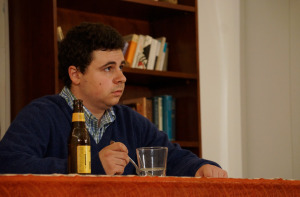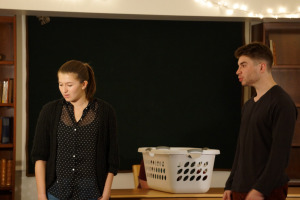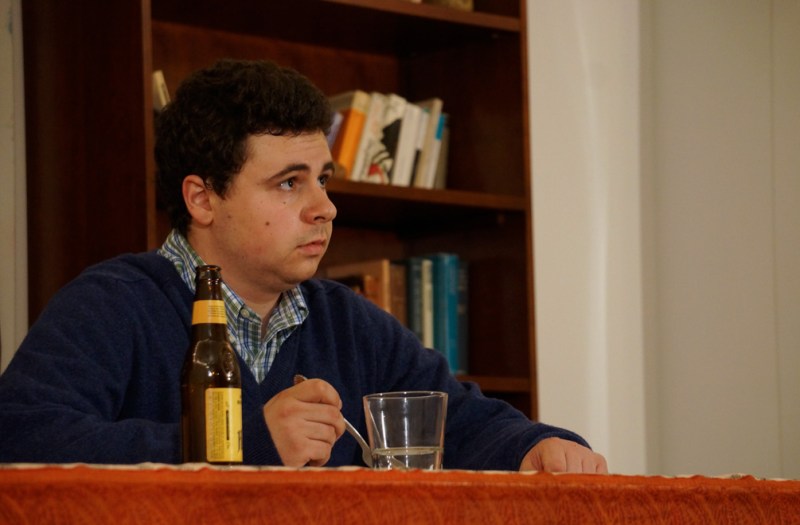
On Wednesday last, I was privileged to see a preview of “The Klaus Conundrum,” an original play produced by Freeks, written by Madelaine Bixler ’17 and directed by Patty Hamilton ’16. Entering Haus Mitt, where the play was staged, I was struck by how modest the space was. Still, the compactness of the space certainly wasn’t the most baffling aspect of the show. While the play demonstrated moments of absolute brilliance, on the whole, I left “The Klaus Conundrum” more confused than moved.
The narrative follows a fairly intricate plot, complicated by numerous flashbacks. “The Klaus Conundrum” tells the story of a German father (Klaus) and his American son (Hendrick), both struggling to relate to the other, after the mother (Gertrude) walks out on them. Embedded in this narrative are allusions to alcoholism, cultural assimilation, musical composition and — of course — potatoes.
Mac Abruzzo ’16 merits commendation for his subdued portrayal of Klaus, the quintessential tortured artist. With epigrams like “Maybe it’s only the dumb farmer who can love his potatoes,” Klaus can easily turn clownish if not given considerable thought. Abruzzo avoided this altogether, using dynamic facial expressions to convey a person, not just an archetype.
The voice of reason, Carson Hicks’ ’16 portrayal of Hendrick served as a strong counterpoint to Klaus’ artistic disposition. Hicks’ naïve, tender rendering of the emotionally bruised son was touching to watch. Also notable was the performance of Kaya McRuer ’17, who demonstrated impressive versatility in her capacity as Gertrude. Her character showed clear signs of evolution, from a whimsical teenager in love to an aggrieved mother.

Unfortunately, I was distracted from these performances by the German accents that pervaded the show. I found myself constantly fixating upon the ostentatious W’s and umlauts instead of on the action. In the end, the poorly executed accents significantly detracted from otherwise good acting.
Speaking of detractors, the usage of space, while inventive, was patently unproductive in evoking meaning. In fact, the cramped stage felt cluttered and oppressive, complicating stage transitions and making actors appear ungainly. True, smaller spaces tend to encourage intimacy between actors and their audience. Nevertheless, any intimacy that would have been established was disrupted by the awkward and frequently obstructive navigation of the space.
As if to compensate for this, the musical direction of Dylan D. Hunn ’18 was stellar. The original and real-time music contributed noticeably to the dramatic tension, while assuming a complementary role that never overwhelmed the players on stage. Unfortunately, this was the only facet of production that consistently held my attention in “The Klaus Conundrum.”
At the end of the day, “The Klaus Conundrum” had some important messages concerning the nature of addiction, parenting, love and cultural divides. Its method for conveying these messages, however, ultimately impeded our understanding of them. Though it had some promising moments, the play was riddled with far too many distractions to impart a meaningful impression on its audience.
Contact Ian at ianstee5 “at” stanford.edu.
